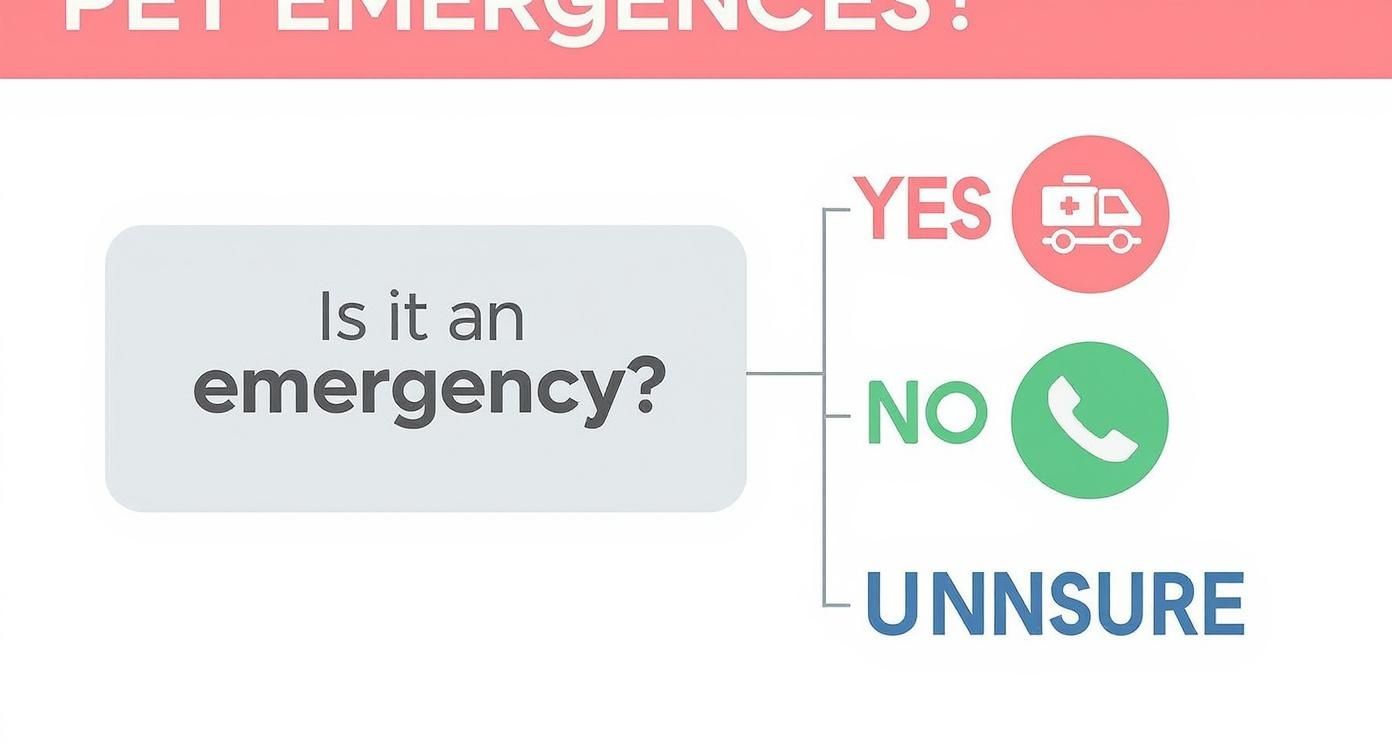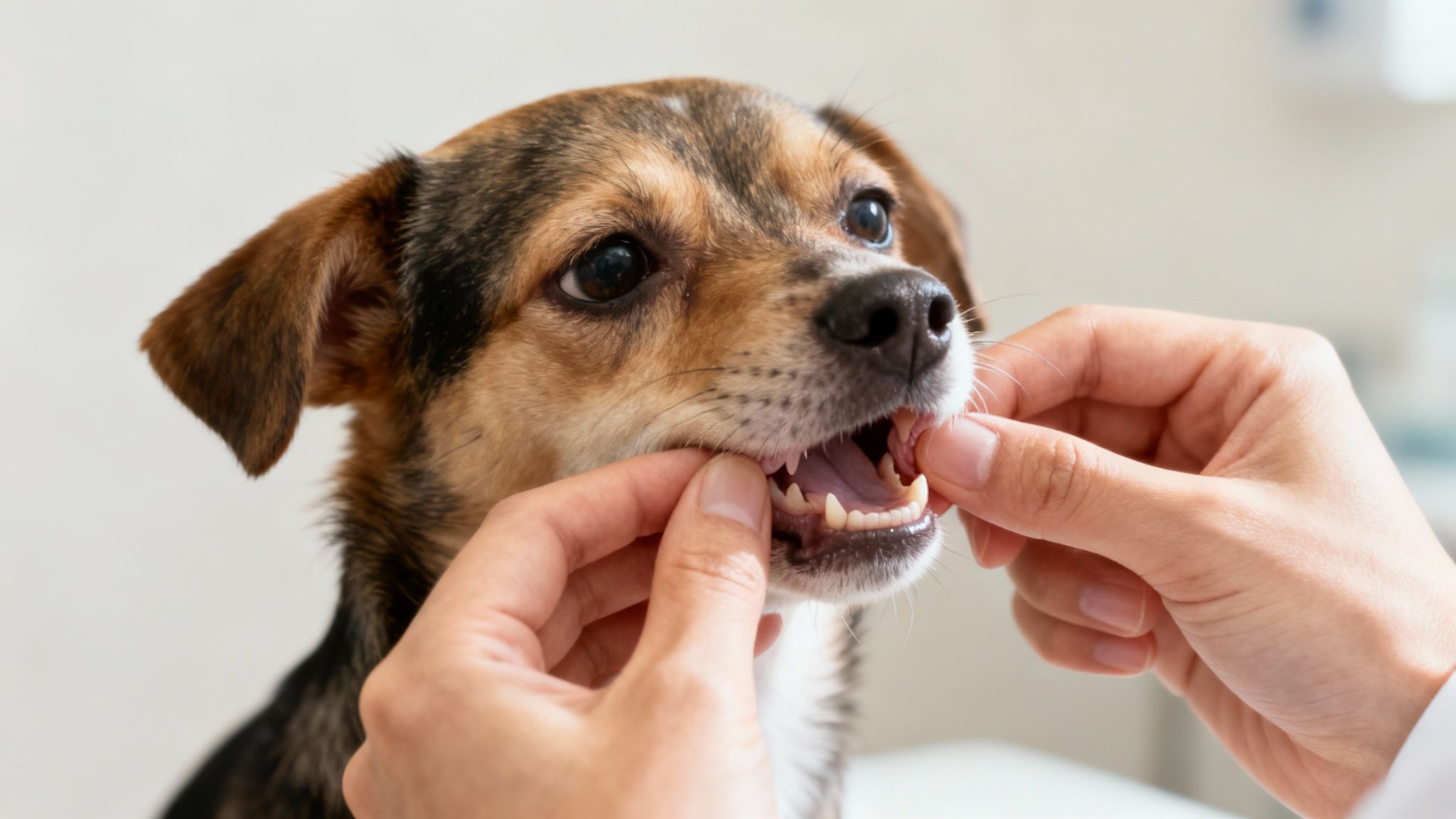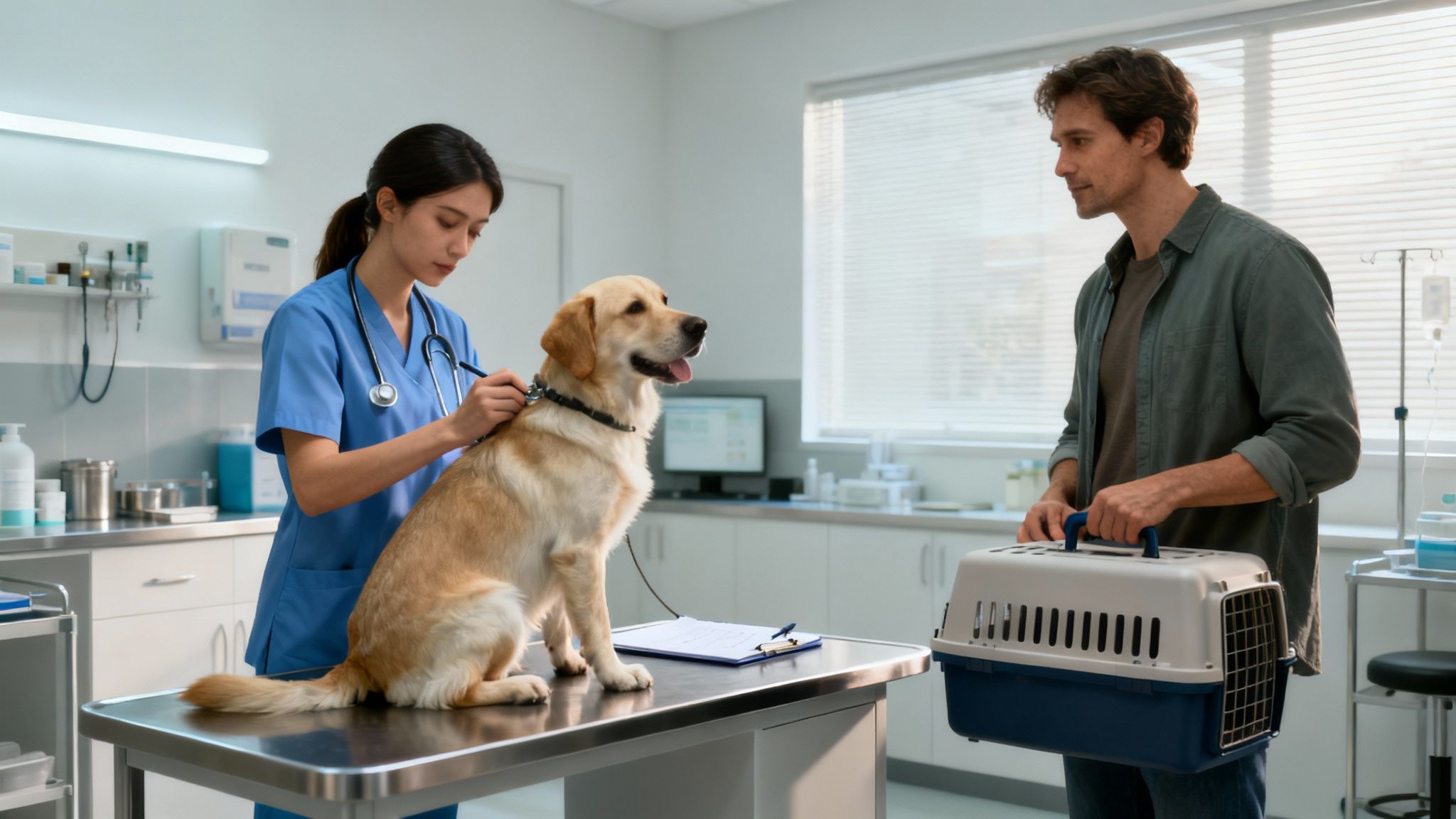When your pet is in distress, every second can feel like an hour. If you're searching for an emergency vet Abu Dhabi, you need to know that immediate, expert help is available. Recognising the critical signs and acting swiftly is the most important first step you can take.
That heart-stopping moment of panic is something every pet owner dreads. You see your pet acting strangely, and your mind races: is this a true emergency, or can it wait for a regular appointment? Cutting through that confusion is vital, as a moment's hesitation can make all the difference.
While obvious trauma like being hit by a car is a clear-cut emergency, many dangerous symptoms are far more subtle. A great first step is learning how to tell if your dog is in pain, as this can give you invaluable insight. Above all, trust your instincts—you know your pet's normal behaviour better than anyone.
It’s often the quiet, less dramatic symptoms that signal the most severe problems. We have to look beyond the obvious and pay close attention to these less apparent but critical warning signs.
This decision tree infographic can help you visualise the process and figure out if you have a true pet emergency on your hands.

As the infographic clearly shows, when you are unsure, the absolute safest course of action is to get professional advice immediately.
To help you make a quick assessment, here’s a table summarising some common emergency signs and what you should do.
This table isn't exhaustive, but it covers some of the most urgent scenarios you might face. When in doubt, always err on the side of caution.
Real-world situations often fall into those tricky grey areas. A dog that eats something seemingly harmless, like a piece of fruit with a pit, could develop a dangerous intestinal obstruction hours later. A cat that just seems unusually quiet and hides under the bed might be in severe pain from an unseen injury.
Your intuition as a pet owner is a powerful tool. If you feel something is seriously wrong with your pet, do not wait. It is always better to seek professional veterinary advice and discover it was a false alarm than to delay and regret it.
When these moments strike, having a plan is everything. Understanding the services and availability of a 24-hour veterinary clinic can be a lifesaver, ensuring you know exactly where to go when time is of the essence. Acting decisively on those subtle clues can be the key to a positive outcome for your beloved companion.
In the chaotic minutes after you've realised your pet is in trouble, what you do before leaving for the vet can have a huge impact. Your goal isn't to be a vet yourself, but to get your pet stable and ready for a safe journey to an emergency vet Abu Dhabi. A few calm, deliberate actions can make all the difference.
First and foremost, think about safety—for both of you. An animal in pain is a scared animal, and they might bite or scratch out of fear, even if they're usually the gentlest soul. Approach them slowly, speaking in a soft, reassuring voice. If you need to move them, try wrapping them gently in a towel or blanket. This not only provides some comfort but also protects you from potential injury.

With safety in mind, your next priority is to tackle any immediate, life-threatening issues while you prepare to get them to the clinic. These are simple but effective things anyone can do before professional help is available.
These aren't complicated procedures, but they are crucial for managing the situation until our veterinary team can take over.
While one person is focused on first aid, someone else can be gathering a few key items. Being organised in these moments saves precious time when you walk through our doors and helps the veterinary team get to work much faster.
The information you bring with you is an invaluable part of the diagnostic puzzle. Details about what happened, when the symptoms first appeared, and any potential toxins your pet was exposed to can guide our vets to the right treatment, fast.
Before heading out the door, try to grab these if you can:
Getting organised helps lower your own stress levels, too, allowing you to focus completely on your pet. For more tips on making any vet visit less stressful, check out our guide on how to prepare for your pet's visit. Your calmness and preparation are key to navigating this difficult moment as effectively as possible.
When you realise something is seriously wrong with your pet, your first instinct might be to rush out the door. But the single most important thing you can do next is to call an emergency vet Abu Dhabi before you leave.
This call isn't just a heads-up; it's a critical part of the emergency process. It gives the veterinary team a chance to get ready for your arrival. They can prepare specific equipment, clear a treatment space, and even give you vital first-aid advice for the journey. A calm, clear phone call literally sets the stage for a better outcome.
It's natural to feel panicked, but taking a moment to breathe and communicate clearly will make a world of difference.
When you call, the person who answers will need a few key details to get the ball rolling. Having this information ready helps everyone move faster.
Think of it as giving them a quick, clear snapshot of the situation.
This isn't the time for a long, detailed story. Stick to the essential facts. Your goal is to arm the clinic with the information they need to prepare.
A simple, factual summary is far more helpful than a panicked, rambling account. Focus on what you can clearly see. "He is bleeding heavily from his back leg," or "She has collapsed and is unresponsive." This kind of clarity is absolutely vital for triage.
Of course, knowing who to call is step one. It’s a great idea for any pet owner in the city to get familiar with our Abu Dhabi clinic locations and save the number for the nearest branch right in your phone. You don't want to be searching for it in a crisis.
The details you provide over the phone are more important than you might think. They help the veterinary team immediately start assessing the urgency of the situation.
For instance, telling us your dog is a 35kg Golden Retriever versus a 4kg Chihuahua who ate chocolate completely changes the potential toxicity level and the treatment plan. Similarly, mentioning that your male cat is straining to urinate immediately flags a possible life-threatening urinary blockage, one of the most serious emergencies we see.
The team might also give you crucial instructions over the phone. They could tell you how to safely muzzle an injured and painful dog to prevent bites, or what to do if your pet is having a seizure. Following their advice is key to keeping your pet as stable as possible—and keeping yourself safe—during transport.
This conversation is the first, vital step in a seamless handover from you to the medical team waiting on the other side.
Walking into an emergency veterinary clinic can be a jarring experience. The atmosphere is often intense, a mix of urgency, worried pet owners, and the sounds of animals in distress. Knowing what’s coming can help lower your own stress levels, letting you stay focused on what’s most important: your pet.
First things first: an emergency clinic doesn’t work on a first-come, first-served basis. The entire system is built around triage, a process that prioritises the most critically ill or injured patients. This means if a pet comes in after you but is in severe respiratory distress, they will be seen immediately.
The triage system is designed to get immediate care to animals whose lives are on the line. As soon as you arrive, a veterinary nurse or technician will perform a rapid assessment of your pet to gauge their stability.
They’ll quickly check vital signs, looking at things like:
Based on this quick check, your pet is assigned a priority level. It’s incredibly difficult to wait when you’re worried sick, but try to remember that the team is working to save the lives of the most critical patients first.
Triage is a swift but vital step. It allows the medical team to immediately identify patients in acute danger—like those with severe trauma, active seizures, or breathing difficulties—and rush them straight to the treatment area. Your patience during this process is so important.
Once your pet is taken to the treatment area, a veterinarian will conduct a more thorough physical examination. At the same time, another team member will talk with you to get a detailed history of what’s been going on. This conversation is just as critical as the physical exam.
Be ready to share specifics about:
Your observations are invaluable clues that help the veterinary team piece the puzzle together. No detail is too small. Something that seems minor to you could be the key piece of information the vet needs to understand the bigger picture.
To get a fast, accurate diagnosis, the emergency vet Abu Dhabi team will almost certainly recommend diagnostic tests. This is where modern veterinary medicine really comes into its own, using advanced tools to get rapid insights into what's happening inside your pet.
The UAE Veterinary Testing Services Market is a huge part of this, valued at around USD 66.32 million and projected to grow beyond USD 100.70 million by 2030. This investment means clinics have access to technology like PCR assays, digital imaging, and ELISA kits to make fast, life-saving decisions. You can read more about the growth of these services and what they mean for the quality of pet care in the region.
After the initial exam and test results are in, the vet will sit down with you to discuss their findings. They will lay out a proposed treatment plan, provide an estimate of the costs involved, and clearly explain the next steps, making sure you’re part of every decision for your pet’s care.

Let's talk about the financial side of things, because it's a reality every pet owner needs to face. Emergency vet care in Abu Dhabi, with its advanced diagnostics, specialised equipment, and 24/7 expert staff, is a significant investment. Being mentally prepared for the costs helps you focus on what truly matters: your pet’s well-being.
You'll almost always be asked for a deposit before any major treatments begin. This isn't a reflection of trust; it's a standard procedure across emergency clinics, including ours. It allows our medical team to jump into action immediately, providing life-saving care without any delays tied to finances. This initial payment usually covers the consultation, a thorough assessment, and the first round of diagnostics to figure out what’s going on.
Once we have a clearer picture of your pet’s condition and a treatment plan, our team will walk you through a detailed estimate. We know how stressful this moment is, so please ask questions. We want to make sure you understand every aspect of the proposed care and the associated fees.
We typically accept the following payment methods:
This is precisely the moment where a good pet insurance policy proves its weight in gold. It’s a financial safety net that empowers you to approve the necessary treatments without having to shoulder the entire cost upfront.
Having pet insurance in place before an emergency strikes can completely change the dynamic, turning a potentially overwhelming financial burden into a manageable one. It’s the peace of mind that lets you say "yes" to the best care for your companion.
For most emergency situations, the process involves you paying the clinic directly and then filing a claim with your provider to get reimbursed. Staying organised makes this much smoother.
As more people in the UAE welcome pets into their families, the veterinary sector has grown stronger to meet the demand. The UAE Veterinary Clinics Market is currently valued at USD 1.2 billion, a figure that highlights the focus on high-quality care, especially in emergencies. You can discover more insights about the UAE veterinary market and see how this growth helps clinics like ours provide the best possible services.
Ultimately, being financially prepared—whether through insurance or a dedicated savings fund—is a fundamental part of responsible pet ownership in Abu Dhabi.
Once you walk out of the clinic doors, the most critical part of your pet’s journey back to health begins. Your role as their caregiver is now the single most important factor in ensuring a smooth and successful recovery. This is your game plan for the days ahead.
Think of the discharge instructions from your vet as your bible for the next little while. Follow them to the letter, especially when it comes to medication schedules and dosages. Skipping a dose or stopping a course of treatment early can seriously set back the healing process.
Your pet needs a calm, quiet, and comfortable space to rest and recuperate. This isn't the time for roughhousing with the kids or visits from your friend's boisterous puppy. Setting up a dedicated recovery zone can make all the difference.
Giving medication can sometimes feel like a wrestling match. For pills, try hiding them in a small piece of cheese, a dollop of peanut butter, or one of those clever pill pockets. If it's liquid medicine, gently hold their head, slip the syringe into the corner of their mouth (between the cheek and gums), and dispense it slowly so they don't choke.
As your pet recovers, you need to become a vigilant observer. Knowing what’s normal and what’s a red flag can help you catch potential complications before they become serious. A bit of grogginess after a procedure is totally normal, but some signs mean you should get straight back on the phone to your emergency vet Abu Dhabi.
A temporary loss of appetite or being a bit lethargic is common for the first 24 hours. However, if your pet refuses to eat or drink for more than a day, or seems unusually withdrawn and listless, it's time to get professional advice.
Don't hesitate to contact your vet if you spot any of these warning signs:
Finally, whatever you do, don't skip the follow-up appointment. These check-ups are absolutely vital. They allow the vet to assess how well your pet is healing, remove stitches if needed, and make any necessary adjustments to their recovery plan. Your diligence at home, paired with professional follow-up care, is the combination that will get your best friend back on all four paws.
When you're in the middle of a crisis with your pet, your mind races with questions. Getting some clarity before an emergency happens is one of the best ways to stay calm and make smart decisions when every second feels like an hour.
This is a question that comes straight from the heart – of course, your first instinct is to help. But when it comes to a real emergency, this is a tricky one.
For a very minor scrape, cleaning the wound with a pet-safe antiseptic is usually okay. Anything more serious than that, however, needs professional eyes. Giving your pet human medication is a definite no-go, as is trying to set a fracture or perform any complex procedure. The risk of accidentally making things worse is just too high. You need an emergency vet Abu Dhabi team for that.
The absolute best first aid you can often provide is simply getting your pet stable and transporting them safely and quickly to a clinic. Trying to do too much at home can sometimes do more harm than good.
It's reassuring to know that veterinary medicine here is taken very seriously. The UAE's vet med market is valued at USD 56.74 million, with significant investment going into the diagnostic tools and treatments that emergency clinics rely on. You can read more about these market developments and their impact on animal care if you're interested in the details.
This focus means that local clinics are better equipped than ever to handle critical situations.
Once your pet is on the road to recovery, always follow your vet’s discharge instructions to the letter. If they give you the all-clear, you might also look into supportive therapies. Some owners find certain natural remedies that can aid in healing to be a helpful addition, but remember, this should only ever be a complement to, not a replacement for, professional veterinary care.
When an emergency strikes, you need a team you can trust. The City Vet Clinic provides expert, compassionate emergency care for your pet when they need it most. Visit us at https://thecityvetclinic.com to find your nearest location.